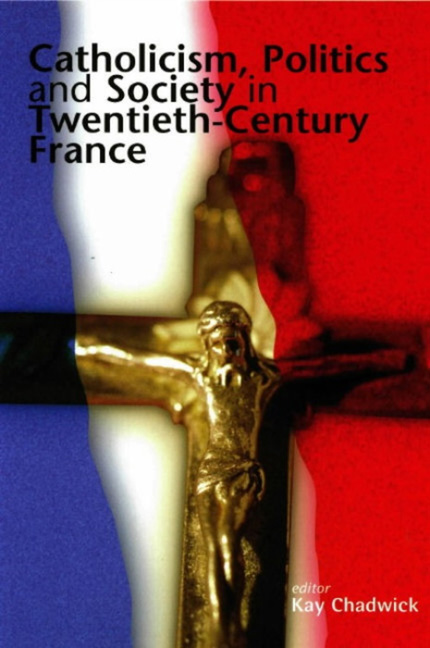Book contents
- Frontmatter
- Contents
- Editor's preface
- Notes on contributors
- Abbreviations
- Introduction
- 1 La laïcité en France au vingtième siècle
- 2 Antisémitisme des catholiques au vingtième siècle: de la revendication au refus
- 3 Catholicism and Nationalism: the Fédération républicaine, 1927–39
- 4 True and false modernity: Catholicism and Communist Marxism in 1930s France
- 5 Ralliés and résistants : Catholics in Vichy France, 1940–44
- 6 Les formes politiques de la démocratie chrétienne en France au vingtième siècle
- 7 Catholicism and the Left in twentieth-century France
- 8 Accueillir l'étranger : immigration, integration and the French Catholic Church
- 9 Yeast in the dough? Catholic schooling in France, 1981–95
- 10 Les femmes catholiques: entre Église et société
- 11 La sociologie religieuse du catholicisme français au vingtième siècle
- 12 Secularisation and the (re)formulation of French Catholic identity
- Select bibliography
- Index
4 - True and false modernity: Catholicism and Communist Marxism in 1930s France
- Frontmatter
- Contents
- Editor's preface
- Notes on contributors
- Abbreviations
- Introduction
- 1 La laïcité en France au vingtième siècle
- 2 Antisémitisme des catholiques au vingtième siècle: de la revendication au refus
- 3 Catholicism and Nationalism: the Fédération républicaine, 1927–39
- 4 True and false modernity: Catholicism and Communist Marxism in 1930s France
- 5 Ralliés and résistants : Catholics in Vichy France, 1940–44
- 6 Les formes politiques de la démocratie chrétienne en France au vingtième siècle
- 7 Catholicism and the Left in twentieth-century France
- 8 Accueillir l'étranger : immigration, integration and the French Catholic Church
- 9 Yeast in the dough? Catholic schooling in France, 1981–95
- 10 Les femmes catholiques: entre Église et société
- 11 La sociologie religieuse du catholicisme français au vingtième siècle
- 12 Secularisation and the (re)formulation of French Catholic identity
- Select bibliography
- Index
Summary
From the viewpoint of an historian of 1930s France, the most important of the three relationships distinguished by Denis Maugenest – those between Church and Communism, between Christians and Marxists and between Catholic faith and Marxism – is undoubtedly that between Church and Communism; and if the Popular Front years (1934–38) were the most important in the decade, this was, from that viewpoint, because they saw an intensification of a ‘lutte d'influence’ between Church and Party for the souls and minds of the French people and specifically for those of the working class. However, the third relationship, that between Catholic faith and Communist Marxism, is worthy of attention, and not only because the 1930s Catholic discovery of Marxism–Leninism and of the philosophy of Marx shaped post-1945 Catholic approaches to Marxism. The ambition of catholicisme intégral to realise ‘tout le christianisme dans toute la vie’ involved more than social and political action, more than the creation of Catholic organisations and the permeation of secular organisations and institutions. It involved also a rejection of a dechristianised modern world (and thus a secularisation theory) and a project of a ‘true’ modernity. This project was articulated primarily as ‘the restoration of the social order’, as illustrated by the subtitle of the May 1931 papal social encyclical, Quadragesimo anno. But the project found expression too as a ‘nouveau Moyen âge’ (the title of the Russian Orthodox philosopher Nikolai Berdyaev's seminal 1927 work), a ‘nouvelle chrétienté’ and a ‘humanisme intégral’ (the title of the neo-Thomist philosopher Jacques Maritain's influential 1936 book).
In the 1930s, and above all in the Popular Front period, the ideal of a nouvelle chrétienté generated powerful critiques of the ‘false’ modernity embodied in the frères ennemis of Western capitalist democracy and Eastern Communist totalitarianism. It especially inspired well-informed dépassements of the ideology of Communism, a system that was seen by the Church as an integral anti-Catholicism, a unity of anti-religious theory and practice, a marxisme intégral. Since these dépassements were elaborated very much in response to the political, social and intellectual challenge posed in the Popular Front period by Communism in general and by the French Communist Party (PCF) in particular, and owed much to the evolution of French intellectual life in the late 1920s and early 1930s, it is with an account of this challenge and of this evolution that we may begin this chapter.
- Type
- Chapter
- Information
- Publisher: Liverpool University PressPrint publication year: 2000



